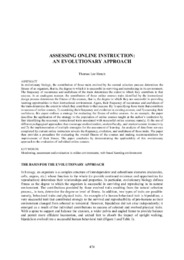Assessing online instruction: an evolutionary approach
Abstract
In evolutionary biology, the contribution of those traits evolved by the natural selection process determines the
fitness of an organism, that is, the degree to which it is successful in surviving and reproducing in its environment.
The frequency of occurrence and usefulness of the traits determines the extent to which they contribute to that
success. In an analogous manner, the contribution of those online courses traits identified by the instructional
design process determines the fitness of the courses, that is, the degree to which they are successful in providing
learning opportunities in their instructional environment. Again, their frequency of occurrence and usefulness of
the traits determine the extent to which they contribute to that success. By 1) specifying those traits that contribute
to success of online courses, 2) examining their frequency and evolution in existing courses, and 3) assessing their
usefulness, this paper outlines a strategy for evaluating the fitness of online courses. As an example, the paper
describes the application of the strategy to the population of online courses taught at the author’s institution by
first identifying the necessary instructional traits associated with successful online courses; namely; 1) the use of
different pedagogical approaches that encourage student/student, student/faculty, and student/content interactivity
and 2) the implementation of multiple strategies for the assessment of learning. An analysis of data from surveys
completed by current online instructors reveals the frequency, evolution, and usefulness of these traits. The paper
then provides a procedure for evaluating the overall fitness of the courses and making recommendations for
improvement of their fitness. The paper concludes by demonstrating the applicability of this evolutionary
approach to the evaluation of individual online courses.
